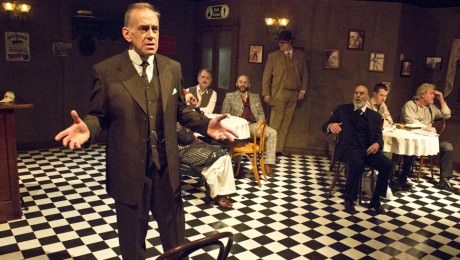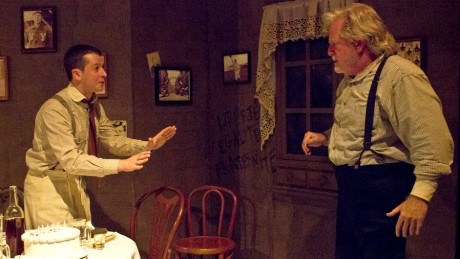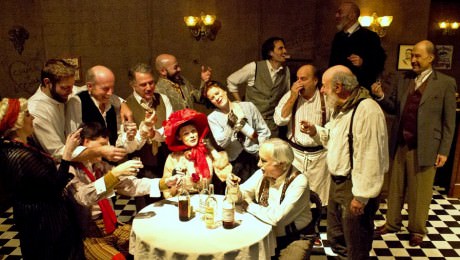Tomorrow. Tomorrow. Tomorrow. Everything will be better tomorrow.
It isn’t often that man attains the true goal of their heart’s desire.
What lies do you tell yourself to make it through a day?
There are no easy answers for the sodden characters of The Iceman Cometh, as they dream away the hours and do as little as possible. They drink.They get soused. They pass out.

The down and out misfit “inmates” of Harry Hope’s saloon manage to stay drunk and keep their pipe dreams – and that’s all they ask out of life. But they don’t always need booze to be drunk, in various stages of despair, the barfly buddies all represent the status of humanity, according to playwright Eugene O’Neill “besotted by its own self-delusion and self-pity.” They are all in denial of their alcoholism, their feelings, and their present day reality.
The exquisite, balanced direction by Michael Avolio and the meticulous 18-member cast of Quotidian Theatre’s latest production quickly absorbs an audience into the tragedy of men’s lies and far-reaching dreams. The Iceman Cometh is a study of man’s need to cling to his hope for a better life, even if he must delude himself to do so.
When one lives without God or a guiding force, this drama revels that salvation is ultimately impossible. Not only will you understand O’Neill ‘s masterwork probe into the dark side of the human soul – by identifying the personalities within the play, one will recognize introspective common ground – adding up to an experience that is only rarely presented. The cumulative power of O’Neill’s play and the exceptional presentation by Quotiditan Theatre Company demands a trip to the Writer’s Center for this hypnotic literary binge.
Eugene O’ Neill is one of the 20th century’s greatest playwrights and a formative influence of drama realism in the shaping of American Theatre. He is also the winner of the Nobel Prize for Literature and four Pulitzer prizes. The Iceman Cometh is a four-act memory play and a tragic story of existence.
It’s 1912, and the hope-forsaken outcasts of Harry Hope’s ‘The Last Chance Saloon’ and the ‘End of the Line Café’ have gathered for their evening of whiskey to contemplate their lost faith and dreams. (1912 is a year that was critical in the playwright’s life and the same year in which his Long Days Journey Into Night is set.)
In the moody and fading light of Don Slater’s lighting design, the bar, a last stop before death, is a dump of a place with years of filth and graffiti writings on the fading walls. Traveling hardware salesman Theodore “Hickey” Hickman (Steve Larocque) knows all about ‘tomorrow’- “I’m the one who wrote the book,” he says. When Hickey visits the saloon he is generally the life of the party, and the “fellow inmates” look to him to cheer them up with his laughter and kindness. When Hickey arrives this year, however something is different. The rounds of drinks still come, but he’s out to convince everyone that he can help them all find peace of mind by ridding themselves of their booze-basted pipe dreams.
Larocque’s charismatic Hickey is working especially hard on his nemeses, Larry Slade (Steve Beall), a former anarchist who has lost his will for life. He is afraid of living but he’s even more scared of death. Beall is convincing as the somber, beaten and tried man who of all the people in the bar is the “philosopher” and one with the most realistic assessment. On the surface, worn down and weathered Larry is not affected by the taunts of Hickey, but his young acquaintance Don Parritt (Chris Stinson) is strangely unnerved by Hickey’s presence. This needling leads to revelations about Parritt’s own mother and feelings of loss, hate, and betrayal.
Hickey is the sharp-talking salesman who can tear you to pieces verbally, and the man who has the message that will save you. An astute judge of people – he’s able to size them up in a glance – as he does with Parritt immediately after meeting him. “I’ve had hell inside of me and I can spot it others,” says Hickey in a testy exchange.

Parritt was brought up a devout believer in “the movement” and he’s lost his faith. He’s views Larry, one of his mother’s former lovers, as a surrogate father. Parritt, who is a betrayer and a coward, is in shock and his neediness helps Hickey to make Larry “wake up to himself.” Stinson plays the psychological trauma and tortured soul with agonizing detail. What I enjoyed most is Stinson’s attentive skill as a reflective listener as Parritt reacts to the depressing world around him. As an actor he is always in the moment. Simply stated, Stinson’s interpretation of Parritt is a dazzling, memorable performance.
Hickey’s motive to make the defeated men face the truth is because he expects and indeed wants them to fail. Perhaps the most pathetic is Harry Hope, a former Tammany politician and the Harry Hope bar owner, who is without hope. He’s so ‘satisfied’ with life that he hasn’t left the bar in twenty years since his wife, Bessie died. He has no need of the outside world. “Of course he is coming back, so are all of the others,” says Hickey, “… and that’s the whole point.” Hickey is convinced that the philosophy of denial will bring freedom and peace within self.
As the night wears thin, the mood changes as everyone has their faith and dreams slowly destroyed by Hickey. Larocque is haunting in his portrayal as the madman who hides behind the smile. The anger of the “inmates” builds and everyone turns on Hickey about his wife and the Iceman. This leads to more revelations and where Hickey’s self-loathing hypocrisy slips out against his will.
Betrayal is a major theme in The Iceman Cometh, and the unfolding drama resonates as an allegory with religious underpinnings and subtle symbolism. Both Parritt and Hickey are outsiders and show what can happen when love is replaced by hate.
Who is the Iceman?
The Iceman represents our subconscious fears and agonies and the death that the harsh ruthlessness of reality brings.
The greatest denier of truth is Hickey himself.There is a demanding, lengthy confession by Hickey where he pretends that he no longer needs illusions. What would have enriched Larocque’s interpretation of the searing monologue is the unraveling of this disturbed man and the nuance and reflective delivery as spoke about his wife, his guilt, and his “peace.” Hickey has preserved the greatest illusion – the illusion that he loved his wife. The tragedy of the gladhanding traveling salesman was that Hickey was his own best customer.
Hickey’s unmasking frees his friends from their stupor. Again, they are able to conclude the illusions are necessary. Larry is the only one to realize that he can no longer remain on “the grandstand of philosophical detachment” and must act now according to his convictions – sealing Parritt’s fate.
Michael Avolio’s keen direction keeps this three-hour production of The Iceman Cometh moving, and it is beautifully staged with one exception. In what I’ll call a misstep, occurs within the closing minutes. My read on the direction for Larry to stand isolated, pacing, shifting, and telegraphing a final key plot point took away from the dramatic build and tension of the previous rising dialogue between Parritt and Larry, instead of feeding into it. The disconnected actions felt false and as played on the evening I saw it, was emotionally inconsistent with the character up to that point.
Avolio has assembled an astounding ensemble of local talent to play the colorful characters in O’Neill’s The Iceman Cometh. Many are performing with Quotidian Theatre for the first time, and there is not enough space to recognize the entire standout performances. Here are few highlights:
– With finesse, and an emotionally engaging style, Frank Britton as Joe Mott is heartbreaking one moment and devastatingly comic the next. Britton has brilliantly discovered the effective moments of humor in O’Neill’s writing and vividly makes the Joe character unforgettable.
– Matt Boliek as Willie Oban, the one time Harvard student of Law who discovered “the loophole of whisky,” succeeds in bringing out the physical edginess in Willie combined with honest interior dialogue and raw, emotional nakedness that few actors are able to do simultaneously. The depth of his talent is something I look forward to seeing more.
– The casting of Carolyn Kashner (Margie) and Genevieve James (Pearl) is perfection; their indelible spirited performances could not be better for the vivacious energy and levity they bring to the production. Their voice and characterizations are pitch perfect as the prostitutes who reside in the Harry Hope saloon. Every time they are on the stage (whether they have dialogue or not) you can’t keep your eyes off them wondering what’s next. I haven’t enjoyed two female performances in a play together this year that have better timing and character chemistry than these two resplendent actors.
– Manolo Santalla owns the role of radical Hugo Kalmar. He is a scene stealer with his drunken diatribe outbursts as he peers behind his crooked spectacles while he clutches his pillow. I have never seen the role performed better – on film or on stage.
In The Iceman Cometh illusions separate men from death as much as it separates them from life. Their life lies give them the illusion of having meaning in life. The reluctance of the characters to face the outside world to pursue their “pipedreams” stems from the awareness of the impossibility of realizing them. It’s also from the fear of losing their only realities – the consolation of friendship and security of their “home” at Harry Hope’s.

We all have hopes, dreams, and illusions.
Despite the brooding pessimism, hard-drinking life, and layers of despair, The Iceman Cometh presented by Quotidian Theatre Company is a play of hope. A gut-wrenching soul search of a play, a masterpiece that asks if the value of truth is worth the pain that can accompany it. Ultimately, O’Neill’s message is to choose life, realizing sometimes folks have to tell themselves lies as a first step in order to move forward and take up living again.
Tomorrow. Tomorrow. Tomorrow. The best is yet to come.
Running Time: Three hours, with one fifteen-minute intermission.
Quotidian Theatre Company‘s production of The Iceman Cometh plays through November 24, 2013 at The Writer’s Center – 4508 Walsh Street, in Bethesda, MD. The venue is a short walk from the Bethesda Metro Station. There is free parking on Saturdays and Sundays. For tickets, purchase them online.





